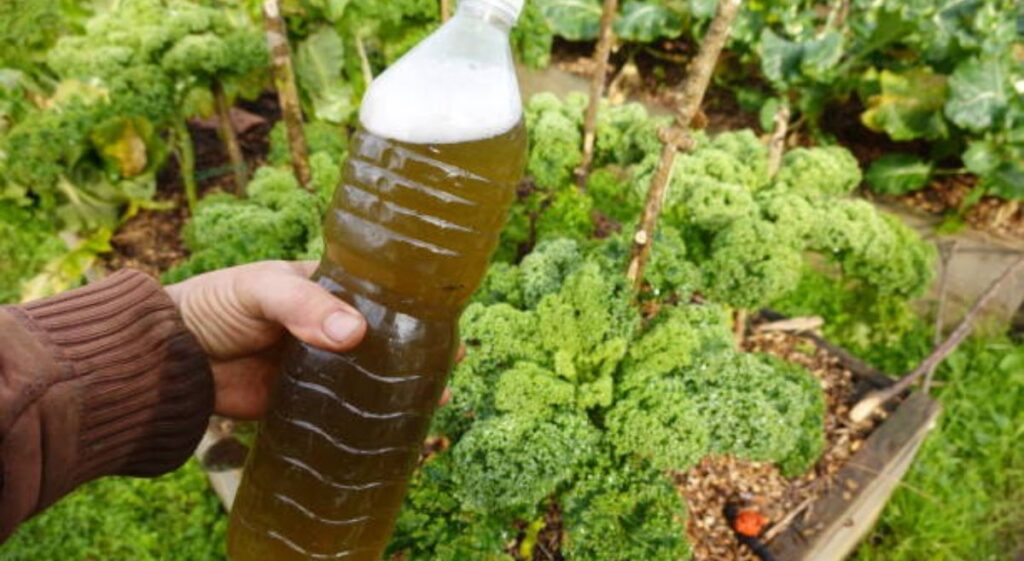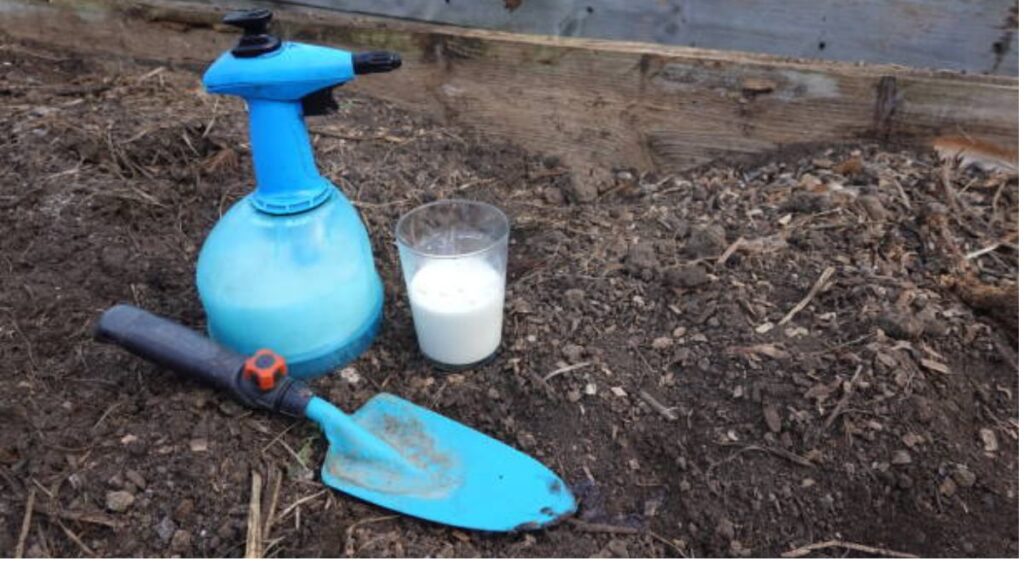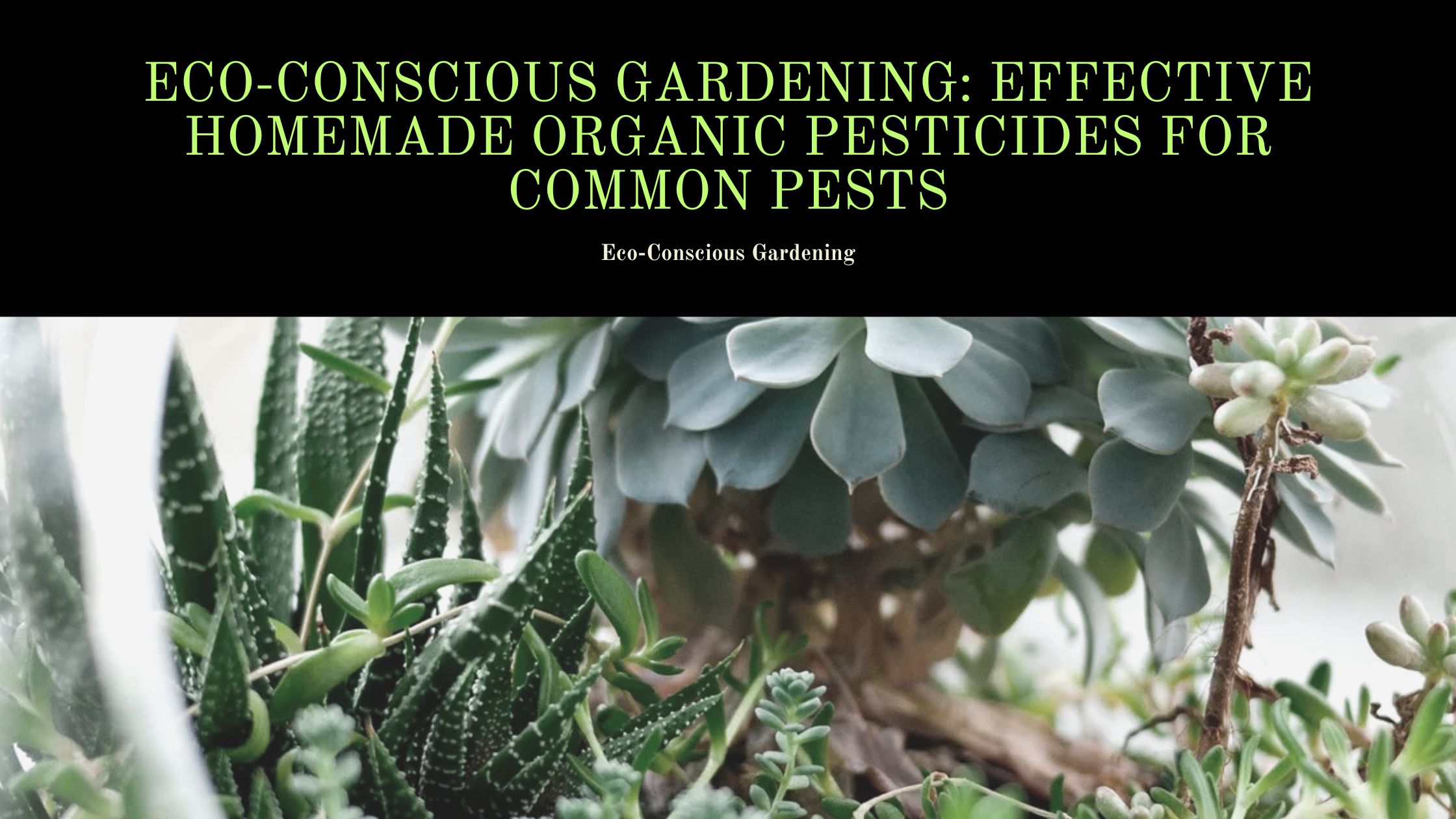Introduction:-
Eco-Conscious Gardening: Effective Homemade Organic Pesticides for Common Pests

In pursuit of a greener and more sustainable garden, utilizing homemade organic pesticides is a wise and environmentally conscious choice. These natural remedies effectively repel pests while minimizing the impact on the ecosystem. This guide provides a comprehensive overview of effective homemade organic pesticides, detailing the necessary ingredients and step-by-step instructions for their creation.
Why Choose Homemade Organic Pesticides?
For environmentally conscious gardeners, homemade organic pesticides are a superior choice over chemical alternatives. These natural solutions offer several key benefits:
1. Environmentally Friendly
- Homemade organic pesticides minimize pollution as they rely on natural ingredients, breaking down easily and leaving no harmful residues in the soil or water.
- These natural remedies are less likely to harm beneficial insects like bees and ladybugs, which play a vital role in maintaining a balanced garden ecosystem.
2. Cost-Effective
- The ingredients used in homemade pesticide recipes are often common household items or inexpensive natural components, making them more affordable than store-bought chemical pesticides.
- The ingredients for these homemade pesticides are easily accessible at home or in local markets, reducing the need for specialized purchases.
3. Safety
- Homemade organic pesticides typically use non-toxic ingredients, making them safer for pets and children who might come into contact with garden plants.
- Unlike some chemical pesticides, organic options are less likely to harm wildlife, such as birds and beneficial insects involved in pollination and pest control.
By choosing homemade organic pesticides, you not only protect your garden from pests but also contribute to a healthier environment. Their eco-friendly, cost-effective, and safe nature make them an excellent alternative to conventional chemical treatments.
Effective Homemade Organic Pesticide Recipes

1. Neem Oil Spray
Ingredients:
- 2 teaspoons of neem oil
- 1 teaspoon of mild liquid soap (like dish soap)
- 1 liter of water
Instructions:
- Mix the neem oil and soap in a spray bottle.
- Add water and shake well.
- Spray the solution on affected plants, especially the underside of leaves, where pests like to hide.
- Apply every 7-10 days or after rain.
Uses: Neem oil disrupts the life cycle of many pests, including aphids, whiteflies, and spider mites.
2. Garlic and Pepper Spray
Ingredients:
- 1 bulb of garlic
- 1 tablespoon of cayenne pepper or hot chili powder
- 1 liter of water
- 1 teaspoon of mild liquid soap
Instructions:
- Blend the garlic with water until smooth.
- Strain the mixture and add the cayenne pepper and soap.
- Let the mixture sit for a few hours, then strain again.
- Pour into a spray bottle and apply to plants.
Uses: This spray repels a variety of pests, including aphids, beetles, and caterpillars.
3. Soap and Water Spray
Ingredients:
- 2 tablespoons of mild liquid soap (like dish soap)
- 1 liter of water
Instructions:
- Mix the soap and water in a spray bottle.
- Shake well and spray directly on pests and affected plant areas.
- Rinse the plants with water after a few hours to avoid any potential soap build-up.
Uses: Effective against soft-bodied insects like aphids, mealybugs, and spider mites.
4. Tomato Leaf Spray
Ingredients:
- 2 cups of chopped tomato leaves
- 1 liter of water
Instructions:
- Soak the chopped tomato leaves in water overnight.
- Strain the liquid into a spray bottle.
- Spray on plants, focusing on areas with visible pests.
Uses: Tomato leaves contain compounds toxic to aphids and other insects.
5. Eucalyptus Oil Spray
Ingredients:
- 1 teaspoon of eucalyptus oil
- 1 liter of water
Instructions:
- Mix the eucalyptus oil with water in a spray bottle.
- Shake well and spray on plants.
Uses: Eucalyptus oil repels flies, beetles, and other common garden pests.
6. Diatomaceous Earth
Ingredients:
- Food-grade diatomaceous earth
Instructions:
- Sprinkle a thin layer of diatomaceous earth around the base of plants and on the leaves.
- Reapply after rain or watering.
Uses: Diatomaceous earth is abrasive to insects like aphids, slugs, and beetles, causing them to dehydrate and die.
7. Onion and Garlic Spray
Ingredients:
- 1 onion
- 1 garlic bulb
- 1 teaspoon of cayenne pepper
- 1 liter of water
- 1 teaspoon of mild liquid soap
Instructions:
- Blend the onion and garlic with water.
- Strain the mixture and add the cayenne pepper and soap.
- Pour into a spray bottle and use on affected plants.
Uses: This spray works well against aphids, beetles, and other pests.
Tips for Using Homemade Organic Pesticides
To ensure the successful application of homemade organic pesticides without harming your plants, follow these vital practices:
- Test Prior to Full Application:
- Why: A small-scale test helps you assess the impact of the pesticide on both the plant and the pests.
- How: Apply a small quantity to a few leaves or stems and observe the plant for any negative reactions within 24-48 hours. Proceed with broader application if there are no adverse effects.
- Regular Application:
- Why: Homemade organic pesticides can degrade over time due to rain and watering, reducing their effectiveness.
- How: Reapply the pesticide regularly, especially after rainfall or heavy watering. Monitor your plants every few days and reapply as needed to maintain pest control.
- Combine Methods:
- Why: Different pests may respond to various types of organic pesticides. Combining methods can address a broader range of pest issues and increase overall effectiveness.
- How: Use multiple types of homemade pesticides or integrate physical barriers and cultural practices (such as encouraging beneficial insects) to complement your pesticide use. For example, use garlic spray for aphids and diatomaceous earth for slugs simultaneously.
By implementing these practices, you can optimize the effectiveness of your homemade organic pesticides, promoting a healthier, pest-free garden.
What are the best natural remedies for slugs and snails in the garden?
Slugs and snails can be persistent pests in the garden, but there are several natural remedies to keep them at bay without resorting to chemical solutions. Here are some of the best methods:

1. Beer Traps
- How it Works: Slugs and snails are attracted to the smell of beer.
- Instructions: Bury a shallow container, such as a saucer or yogurt cup, in the ground so that its rim is level with the soil. Fill it with beer. Slugs and snails will be drawn to it, fall in, and drown.
- Tip: Check and empty the traps regularly, and replace the beer every few days.
2. Copper Barriers
- How it Works: Copper reacts with the slime that slugs and snails produce, giving them a mild electric shock that deters them from crossing it.
- Instructions: Place copper tape or strips around the base of plants, pots, or raised beds. Ensure there are no gaps for the slugs and snails to bypass the barrier.
3. Crushed Eggshells
- How it Works: The sharp edges of crushed eggshells are uncomfortable for slugs and snails to crawl over.
- Instructions: Scatter crushed eggshells around the base of plants. This not only deters pests but also adds calcium to the soil.
4. Diatomaceous Earth
- How it Works: Diatomaceous earth is a natural powder made from fossilized algae. It’s abrasive to the soft bodies of slugs and snails, causing them to dehydrate.
- Instructions: Sprinkle a ring of food-grade diatomaceous earth around plants. Reapply after rain or watering.
5. Coffee Grounds
- How it Works: The caffeine in coffee is toxic to slugs and snails.
- Instructions: Spread used coffee grounds around plants as a barrier. It also acts as a mild fertilizer.
6. Garlic Spray
- How it Works: Slugs and snails dislike the smell and taste of garlic.
- Instructions: Make a garlic spray by blending a few cloves of garlic with water. Strain the mixture and spray it on plants and around the garden perimeter. Reapply after rain.
7. Salt Barriers (Use with Caution)
- How it Works: Salt causes slugs and snails to dehydrate and die.
- Instructions: Sprinkle salt in areas where slugs and snails are a problem, but avoid using it directly on plants or soil as it can harm them.
- Tip: Use salt sparingly and only as a last resort.
8. Create a Dry Environment
- How it Works: Slugs and snails prefer moist environments.
- Instructions: Reduce watering in the evening, and create barriers of dry, sharp materials like gravel or sand around plants. This makes it difficult for slugs and snails to navigate.
9. Attract Natural Predators
- How it Works: Encouraging wildlife that feeds on slugs and snails can naturally reduce their population.
- Instructions: Attract birds by providing bird feeders or baths, and encourage ground beetles, frogs, and hedgehogs by creating habitats like log piles or ponds.
10. Manual Removal
- How it Works: Hand-picking slugs and snails is a simple, effective method.
- Instructions: Go out in the early morning or evening when slugs and snails are most active, and remove them from plants. Dispose of them far from your garden or in a bucket of soapy water.
11. Decoy Plants (Sacrificial Plants)
- How it Works: Planting decoy plants that slugs and snails prefer can lure them away from more valuable crops.
- Instructions: Grow plants like lettuce or marigolds in an area away from your main garden to attract slugs and snails, keeping them away from other plants.
Using these natural remedies, you can effectively control slugs and snails in your garden without harmful chemicals. Combining several methods often provides the best results, keeping your garden healthy and pest-free.
Conclusion
Incorporating homemade organic pesticides into your garden is a stride toward environmentally conscious gardening practices. This approach not only promotes the health of your plants but also sustains the overall balance of the ecosystem. By harnessing the power of natural ingredients, you can effectively address pest issues while preserving the well-being of beneficial insects and wildlife within your garden. Experiment with these recipes and adapt them to your specific pest challenges, fostering a thriving, greener, and more vibrant outdoor space.
References:
- Gardening Know How: Natural Ways To Get Rid Of Slugs
- BBC Gardeners’ World: How to Protect Your Plants from Slugs and Snails
- The Old Farmer’s Almanac: Slug and Snail Control
